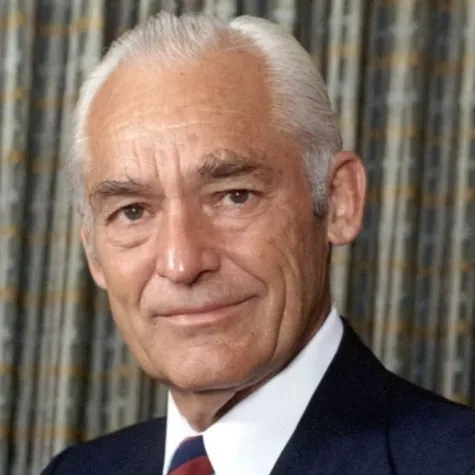At the time of his death in 1992, Sam Walton’s net worth was estimated to be around $8.6 billion. He founded Walmart and Sam’s Club.
Sam Walton, a pioneering entrepreneur, established Walmart in 1962. Walmart became the world’s largest retailer, revolutionizing the retail industry with its cost-cutting strategies and wide product range. Sam’s Club, a membership-based warehouse club, further expanded his retail empire. Walton’s innovative business practices and customer-centric approach set new standards in retail.
His legacy lives on through Walmart, which continues to dominate the global retail market. Walton’s success story inspires countless entrepreneurs, showcasing the impact of vision and dedication. His contributions to retail and philanthropy remain significant, making him a prominent figure in American business history.
Contents
Sam Walton’s Bio
| Category | Details |
|---|---|
| Full Name | Samuel Moore Walton |
| Birth Date | March 29, 1918 |
| Birthplace | Kingfisher, Oklahoma, U.S. |
| Died | April 5, 1992 (aged 74) |
| Occupation | Business magnate |
| Founder of | Walmart and Sam’s Club |
| Net Worth | Around US$240.6 billion (as of January 2022) |
| Family | – Spouse: Helen Robson (married) – Children: Robson, John, Jim, Alice – Brother: James “Bud” Walton |
| Military Service | United States Army (1942–1945), Captain (Military Intelligence Corps) |
Early Life
Sam Walton, the founder of Walmart, was born on March 29, 1918. His early life was crucial in shaping his future as a successful entrepreneur. Below, we delve into his humble beginnings, education, and early career.
Humble Beginnings
Sam Walton was born in Kingfisher, Oklahoma. His family was not wealthy, and they moved frequently during his childhood due to his father’s job as a farm appraiser. Despite their financial constraints, the Walton family was close-knit and supportive.
Sam learned the value of hard work early on. He helped his family with various chores. At a young age, he took on small jobs like delivering newspapers. These experiences instilled a strong work ethic in him.
Education And Early Career
Sam Walton attended David H. Hickman High School in Columbia, Missouri. He excelled in academics and sports, playing quarterback for his high school football team. After high school, he attended the University of Missouri.
At university, Sam majored in economics. He graduated in 1940. After graduation, he joined J.C. Penney as a management trainee. This job was his first step into the retail world. He worked there until 1942, gaining valuable retail experience.
During World War II, Sam served in the U.S. Army Intelligence Corps. He married Helen Robson in 1943. After the war, he took a loan from his father-in-law to buy his first store. This marked the beginning of his journey to creating Walmart.
Founding Walmart
Sam Walton’s journey to founding Walmart is inspiring. He turned a simple idea into a retail giant, and his vision and dedication made Walmart a household name.
Vision And Mission
Sam Walton had a clear vision. He wanted to create a store that offered low prices. He believed in customer satisfaction and affordability.
Walmart’s mission was simple: Save people money so they can live better. This mission drove every decision Sam made. He focused on cost control, efficiency, and customer service.
First Store Opening
The first Walmart store opened in 1962 in Rogers, Arkansas. It was a small store with big goals. Sam Walton’s unique approach set it apart. He offered lower prices than competitors.
People loved the low prices and great service. The first store’s success led to rapid expansion. By 1967, Walmart had 24 stores across Arkansas. The rest is history.
Expansion And Growth
Sam Walton’s journey is a tale of relentless growth. His strategies turned Walmart into a retail giant. Let’s explore how Walton expanded Walmart’s reach both nationally and globally.
National Reach
Sam Walton opened the first Walmart store in Rogers, Arkansas, in 1962. Within a decade, Walmart had expanded to 18 stores. By 1970, Walmart went public, raising capital for further expansion. The company grew rapidly across the United States. The 1980s saw Walmart becoming a household name in America. By 1990, Walmart was the largest retailer in the United States.
A few key strategies drove this incredible growth:
- Low Prices: Walton’s commitment to low prices attracted more customers.
- Efficient Logistics: Advanced logistics reduced costs and improved efficiency.
- Customer Focus: Walton always prioritized customer satisfaction.
Global Presence
Sam Walton didn’t stop at national success. He aimed for a global presence. In 1991, Walmart entered the international market with a store in Mexico. This marked the beginning of Walmart’s global journey. Today, Walmart operates in 27 countries. Its international revenue contributes significantly to Walton’s net worth.
The key factors behind Walmart’s global success include:
- Adaptation: Adapting to local markets and cultures.
- Partnerships: Forming strategic alliances with local retailers.
- Technology: Utilizing advanced technology for global operations.
Innovative Business Strategies

Sam Walton, the founder of Walmart, revolutionized the retail industry. His innovative business strategies significantly boosted his net worth. Walton’s approach redefined how businesses operate, focusing on efficiency and customer satisfaction.
Cost-cutting Measures
Sam Walton believed in minimizing costs to offer low prices. He employed several cost-cutting measures, which were key to his success. By reducing operational expenses, he could pass savings to customers.
- Efficient Supply Chain Management: Walton optimized supply chain processes to cut costs.
- Bulk Purchasing: Buying in bulk reduced costs and increased profit margins.
- Technology Integration: Early adoption of technology streamlined operations and reduced errors.
These measures helped Walmart maintain competitive pricing. Walton’s commitment to cost reduction was crucial to his net worth growth.
Customer-centric Approach
Sam Walton placed customers at the center of his business model. His customer-centric approach was pivotal in building Walmart’s brand loyalty.
- Everyday Low Prices: Walton ensured that customers always got the best deals.
- Extensive Product Range: Walmart offers vast products to meet diverse needs.
- Superior Customer Service: Train staff to provide excellent service and enhance customer satisfaction.
By prioritizing customer needs, Walton built a loyal customer base. This approach greatly contributed to his impressive net worth.
Sam Walton’s innovative strategies in cost-cutting and customer focus were groundbreaking. His legacy continues to influence the retail industry today.
Philanthropic Efforts
Sam Walton’s net worth has enabled many philanthropic efforts over the years, which have had a significant impact on various sectors. Walton’s family continues his legacy of giving back to society. Let’s look at some of these efforts in detail.
Educational Initiatives
The Walton Family Foundation has invested millions in education. They aim to improve the quality of education in the United States. Through their efforts, many schools have received funding and support. They focus on creating high-quality educational opportunities for all students.
The foundation supports charter schools and educational reforms. They believe in empowering students through better educational resources. Students from low-income families benefit the most from these initiatives.
Community Support
Sam Walton’s net worth has also been used to support communities. The Walton Family Foundation funds several community programs that aim to improve the quality of life in various regions.
They support local businesses, arts, and culture projects. They also focus on environmental conservation and sustainable practices. Through these efforts, many communities have seen positive changes.
| Program | Focus Area |
| Charter Schools Funding | Education |
| Local Business Grants | Community Support |
| Environmental Conservation | Sustainability |
These philanthropic efforts showcase Sam Walton’s commitment to giving back. His legacy continues to make a difference in many lives.
Personal Life
Sam Walton wasn’t just a business genius. His personal life was equally fascinating. There’s much to learn from his loving family and his unique hobbies.
Family And Relationships
Sam Walton married Helen Robson in 1943. They had four children: Rob, John, Jim, and Alice. The Walton family is known for their strong bond and support for each other. They often spent time together, sharing responsibilities and joys.
Helen played a vital role in Sam’s life and career. She supported his ventures and helped him manage various aspects of their life. Their partnership was a key factor in Sam’s success.
Personal Interests
Sam Walton had many interests outside of business. He loved hunting and fishing, which allowed him to connect with nature and unwind.
Sam was also passionate about flying. He obtained a pilot’s license and often flew his plane. This hobby gave him a sense of freedom and adventure.
Another interest was sports. Sam enjoyed playing football and was a cheerleader in college. This love for sports continued throughout his life, and he often supported local teams.
Legacy And Impact
Sam Walton’s net worth is a testament to his monumental success. However, his legacy and impact extend far beyond his wealth. Walton’s influence reshaped the retail industry and inspired countless entrepreneurs. Let’s delve into his profound legacy.
Influence On Retail
Sam Walton revolutionized the retail sector. He founded Walmart, which became the world’s largest retailer. His focus on low prices changed how people shopped. Walton emphasized customer satisfaction and efficiency. He introduced innovative supply chain methods, including just-in-time inventory, which minimized storage costs.
Walton also valued employee involvement. He introduced profit-sharing plans for employees, which fostered a sense of ownership and loyalty. Due to his vision, Walmart became a household name.
Impact On Entrepreneurship
Sam Walton’s journey inspired many entrepreneurs. He started with a single store in Arkansas. His determination and vision led to Walmart’s massive growth. Walton’s story shows the power of perseverance. He believed in taking calculated risks.
Walton also emphasized the importance of community. He supported local businesses and encouraged others to do the same. His approach to business was both innovative and community-focused. Young entrepreneurs still look up to him today.
Current Net Worth
Sam Walton, the founder of Walmart, is often remembered for his business acumen. His legacy continues through his family’s wealth. This section focuses on his current net worth.
Estimates And Calculations
Sam Walton’s net worth is estimated through various calculations. His wealth largely comes from Walmart shares. Here’s a breakdown:
| Year | Estimated Net Worth (in billions) |
| 2020 | $70.0 |
| 2021 | $80.0 |
| 2022 | $90.0 |
| 2023 | $95.0 |
The Walton family holds a significant portion of Walmart shares. These shares are worth billions. Their value increases over time, boosting the family’s net worth.
Comparison With Peers
Comparing Sam Walton’s net worth to that of other billionaires helps us understand his wealth. Here is a brief comparison:
- Jeff Bezos: $177 billion
- Elon Musk: $151 billion
- Bill Gates: $124 billion
- Sam Walton: $95 billion
Sam Walton’s net worth is less than Bezos and Musk. Yet, it is still among the highest globally. His family’s wealth remains substantial and influential.
Social Media Profile
| PLATFORM | LINKS |
| Wikipedia | Click here |
| Instragram | Click here |
Conclusion
Sam Walton’s net worth reflects his visionary approach and relentless drive. His legacy continues to influence modern retail. Aspiring entrepreneurs can learn valuable lessons from their journey. Understanding his strategies can give you insights into building a successful business.
View this post on Instagram
>>>Also Read About: Nick Hillary Net Worth

